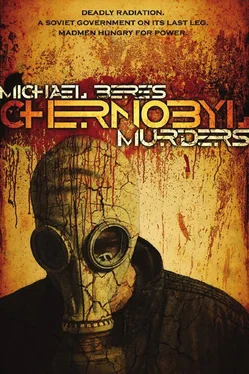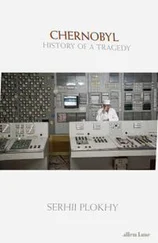Michael Beres - Chernobyl Murders
Здесь есть возможность читать онлайн «Michael Beres - Chernobyl Murders» весь текст электронной книги совершенно бесплатно (целиком полную версию без сокращений). В некоторых случаях можно слушать аудио, скачать через торрент в формате fb2 и присутствует краткое содержание. Жанр: Триллер, на английском языке. Описание произведения, (предисловие) а так же отзывы посетителей доступны на портале библиотеки ЛибКат.
- Название:Chernobyl Murders
- Автор:
- Жанр:
- Год:неизвестен
- ISBN:нет данных
- Рейтинг книги:4 / 5. Голосов: 1
-
Избранное:Добавить в избранное
- Отзывы:
-
Ваша оценка:
- 80
- 1
- 2
- 3
- 4
- 5
Chernobyl Murders: краткое содержание, описание и аннотация
Предлагаем к чтению аннотацию, описание, краткое содержание или предисловие (зависит от того, что написал сам автор книги «Chernobyl Murders»). Если вы не нашли необходимую информацию о книге — напишите в комментариях, мы постараемся отыскать её.
Chernobyl Murders — читать онлайн бесплатно полную книгу (весь текст) целиком
Ниже представлен текст книги, разбитый по страницам. Система сохранения места последней прочитанной страницы, позволяет с удобством читать онлайн бесплатно книгу «Chernobyl Murders», без необходимости каждый раз заново искать на чём Вы остановились. Поставьте закладку, и сможете в любой момент перейти на страницу, на которой закончили чтение.
Интервал:
Закладка:
At first, because of the way Captain Brovko went into the wine cellar and hurried out in a frenzy announcing Komarov’s death and ordering men about, Nikolai thought the brutality might continue.
But after Horvath and the others were in the house and men had been posted at every possible exit, Brovko grew calm and asked Nikolai to accompany him into the wine cellar.
Komarov’s body was near the back wall of the cellar. He lay sprawled out on his stomach, his head twisted to one side, eyes open wide and glistening wet in the beam of the flashlight. Brovko aimed the flashlight at Komarov’s eyes for some time. Even in death, the major’s eyes seemed demonic. Because his face was twisted sideways against the dirt floor, Komarov’s mouth was contorted into an insane grin, showing yellow-stained teeth.
Below Komarov’s waist, a pool of blood extended out in all directions, soaking into the dry soil. Komarov’s lower back was arched upward slightly, and when Brovko used his foot to push Komarov over onto his back, Nikolai saw the knife. It was embedded deep in the major’s abdomen above the groin. Only part of the handle showed.
Brovko took out a handkerchief, wrapped it about the knife handle, and pulled. There was a liquid gurgle as the knife came out. The sound, combined with the smell of released bowels and Komarov’s tobacco, nauseated Nikolai. He backed away to the entrance where the air was better. He found a bench tipped on its side, righted it, and sat down.
Brovko stayed at the body, wiping the knife and inspecting it.
Then Brovko placed the knife and handkerchief beside the body and joined Nikolai on the bench. Brovko sat closer to the entrance, and although the flashlight was out, Nikolai could see Brovko’s profile against the light from the entrance.
“A lot of blood,” said Brovko. “The pressure of his weight pushed the knife in past the hilt. It apparently severed a main blood vessel, and he quickly bled to death.”
“It was his own knife,” said Nikolai. “I saw him take it out of his pocket before he came down here. A folding knife.”
“A large one,” said Brovko. “I saw the major with it once before, in Kiev. He threatened an old man playing a violin on Lenkomsomol Square.”
“She must have gotten the knife away from him somehow.”
“Perhaps,” said Brovko. “But it’s also possible that in the midst of the struggle, he simply fell onto it.”
“I suppose it’s possible.”
“She was unarmed,” said Brovko. “All we found on her were car keys and four hundred rubles. She had it in a sock pinned inside her blouse. She said she left the car in the village. I sent two men after it. A black Skoda, which was originally white. I saw the black paint on Horvath’s hands after he was captured.”
Brovko was silent, staring straight ahead, his Germanic profile unmoving. Then he turned. “Tell me something, Nikolai. Do you think Major Komarov noticed the paint on Horvath’s hands?”
“I don’t know.”
“He was with Horvath all night, as you know. One thing puzzling me is that he didn’t send men out looking for the car.”
“I’m not sure what you’re getting at, Captain.”
“Listen to me, Nikolai. We both saw what happened up there.
We both witnessed Komarov’s actions, myself more than you. Last night you saw Komarov aim his pistol at me. This morning we all saw him fire an AKM into this cellar when he knew women and children were down here. I’ve taken over command from a crazy man. Immediately after the Chernobyl explosion, he was told there could be another, even worse explosion, yet instead of investigating this possibility, instead of gathering information about the disaster according to the general directive from Moscow, the major pursued his own investigation. He convinced Deputy Chairman Dumenko he had evidence of sabotage. And I must now decide what to do.”
“What do you want from me?”
“I want you to listen to what I have to say. When I’m finished, I want you to tell me what you know. No one can hear us down here.
You are the only other member of the KGB who knows vital details concerning this case.”
“Very well, Captain. I’m listening.”
“Good, Nikolai. There are several factors to consider. The first is the nature of Komarov’s interrogation. He immediately began using what we call the active method of interrogation on Detective Horvath and Bela Sandor. He wanted to know where Juli Popovics was, and he wanted to know where the women and children had gone. During the time I was with him, this was the extent of his questioning. Not once did he ask about Chernobyl. Not once did he ask about technical details of the so-called sabotage. He treated Detective Horvath as if he were extremely dangerous, as if the man would try to kill anyone in his path. I found this to be untrue. Horvath was even careful when sneaking up on our men so as not to seriously injure anyone. Doesn’t this seem odd?”
“Yes,” said Nikolai. “It all seems especially odd to me, because when Pavel and I arrived in Kiev, the major emphasized Detective Horvath’s threat while seemingly forgetting what had happened at Chernobyl. When we went to pick up Juli Popovics, we were told to be careful of Horvath because he was a murderous saboteur. Last night, when he arrived here, Horvath could have killed Komarov.
And I think he might have.”
“Why didn’t he?” asked Brovko.
“Because he would have had to kill others. Last night he could have easily killed me and made it into the house. When he climbed in the window, I could have killed him but did not. Yes, he shot Pavel. But Major Komarov was the real killer. Major Komarov was the one who frightened Pavel into aiming his pistol at Detective Horvath and Juli Popovics. Pavel and I were not trained as you were, Captain. I told Major Komarov this when we arrived in Kiev.
But he insisted we be put on the case. He made it sound as if he were doing us a favor. Pavel’s death was what Major Komarov needed so he could have a more substantial case against Detective Horvath and Juli Popovics.”
Brovko touched Nikolai’s arm. “Thank you for speaking freely with me. I will return the favor. Komarov left a trail of death in Kiev, and now we are here with his body…”
Brovko let go of Nikolai’s arm and looked straight ahead again, his profile more exposed because of the brightening light from the entrance as the morning sun rose higher.
“What will you do now, Captain?”
“I’m only certain of one thing at this moment, Nikolai.”
“What’s that?”
“Major Komarov died in an accident in which he stumbled in a dark wine cellar and fell onto his own knife. Do you agree?”
“I agree, Captain. Are fingerprints on the knife?”
“No fingerprints.”
Brovko stood, went to the ladder, and climbed to daylight.
Nikolai hurried after him, glad to be away from the smell of wine defiled by the odor of death.
For the remainder of the morning and well into the afternoon, Captain Brovko spoke to each of the men individually. The two men sent after the car returned, saying they found the black Skoda in the village and searched it but found nothing. Late in the afternoon, Brovko sent all but Nikolai and four other men back to Kiev.
The men returning to Kiev were new to the KGB, a few on their first assignment. They loaded Komarov’s body into the van and took it with them. Nikolai stood at the front of the house with Brovko and watched as the men drove off and disappeared down the hill.
“I told the men to pick up the Skoda on their way back through the village,” said Brovko.
“I hope it starts,” said Nikolai.
“It will,” said Brovko. Then, turning to the house. “Everyone agrees. Major Komarov had gone mad.”
Читать дальшеИнтервал:
Закладка:
Похожие книги на «Chernobyl Murders»
Представляем Вашему вниманию похожие книги на «Chernobyl Murders» списком для выбора. Мы отобрали схожую по названию и смыслу литературу в надежде предоставить читателям больше вариантов отыскать новые, интересные, ещё непрочитанные произведения.
Обсуждение, отзывы о книге «Chernobyl Murders» и просто собственные мнения читателей. Оставьте ваши комментарии, напишите, что Вы думаете о произведении, его смысле или главных героях. Укажите что конкретно понравилось, а что нет, и почему Вы так считаете.












